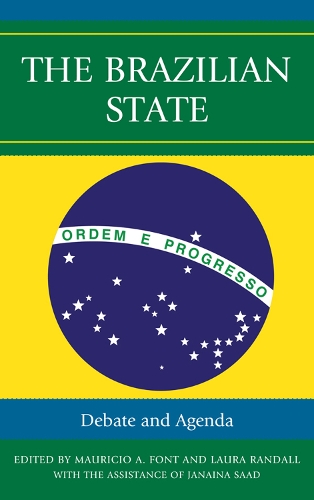
The Brazilian State: Debate and Agenda
(Paperback)
Publishing Details
The Brazilian State: Debate and Agenda
By (Author) Mauricio Font
Edited by Laura Randall
Contributions by Monica Arruda de Almeida
Assisted by Janaina Saad
Contributions by Glauco Arbix
Contributions by Leslie Elliott Armijo
Contributions by Renato Boschi
Contributions by John F. Collins
Contributions by David Fleischer
Contributions by Ana Cristina Braga Martes
Bloomsbury Publishing PLC
Lexington Books
28th August 2013
United States
Classifications
Professional and Scholarly
Non Fiction
Constitution: government and the state
Diplomacy
International relations
338.981
Physical Properties
Paperback
434
Width 152mm, Height 229mm
Description
The Brazilian State: Debate and Agenda is part of the Bildner Western Hemisphere Studies Series. This book is a collection of 16 essays from the conference The Brazilian State: Paths and Prospects of Dirigisme and Liberalization held at The Graduate Center, City University of New York in November 2009. The Brazilian State explores the changing roles, relations with society, and overall impact of the contemporary Brazilian State, including, the newly elected Dilma Rousseff. Collectively, the papers explore state reform, institutional development, policy effectiveness, and economic dynamics since the 1930s.
Reviews
Maucio Font and Laura Randall's The Brazilian State: Debate and Agenda provides a fascinating multi-leveled examination of Brazilian political institutions and policies. Bringing together leading Brazilian and North American scholars in this field, the book provides a depth of insights rarely found in other English-language texts on the state and policymaking in Latin America's largest country. This volume makes important contributions to the debate on political institutions in Brazil and to issues in Latin America more generally. -- Desmond Arias, John Jay College and the Graduate Center, City University of New York
The Brazilian State: Debate and Agenda is an up-to-date analysis of the state in the "new developmentalism" of Brazil. It provides us with excellent research on the political, social, economic, and cultural evolution of Brazil, especially since 2005. This highly readable book is well edited by noted authors Font and Randall and will serve as a classroom text and also will be suitable for a general audience. To understand Brazil today and to speculate about its future, this book is essential. -- Kathleen Waldron, President of William Paterson University
This timely volume explores how Brazil avoided the extremes of left and right to become a pragmatic model of democratic development. Brazil's success in combining macroeconomic stability with economic growth and expanded social programs is an inspiration to a world that is rejecting extremist nostrums and authoritarian excuses. These well researched essays show how the Brazilians did it, and what remains to be done, both in Brazil and throughout the developing world. -- Ted Goertzel
The Brazilian State has several distinctive attributes....Thomas Trebat extends the scope of the book by examining Brazilian foreign policy, and the extent to which the BRazilian state represents an alternative, in matters of global governance, to what he calls the 'transatlantic community'. * Journal of Latin American Studies *
Author Bio
Editors:
Mauricio A. Font is professor of sociology at the Graduate Center and Queens College, City University of New York, where he is also director of the Bildner Center for Western Hemisphere Studies.
Laura Randall is the author of Factors Affecting Learning and Cost Effective Schooling in Latin America, and of The Political Economy of Brazilian Oil.
Janaina Saad is a research associate at the Bildner Center for Western Hemisphere Studies.
Contributors:
Monica Arruda de Almeida, Glauco Arbix, Leslie Elliott Armijo, Renato Boschi, John F. Collins, David Fleischer, Mauricio Font, Christine Gustafson, Elaine da Silveira Leite, Maria Rita Loureiro, Lia Zanotta Machado, Ana Cristina Braga Martes, Scott B. Martin, Joo Paulo M. Peixoto, Ceclia Olivieri, Laura Randall, Eiiti Sato, Jos Roberto Ferreira Savoia, Fernando Sotelino, J. Ricardo Tranjan, Thomas J. Trebat
